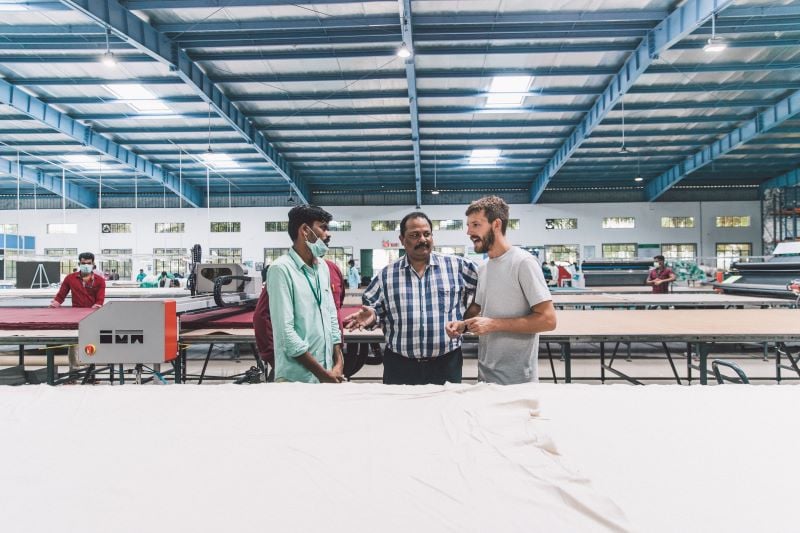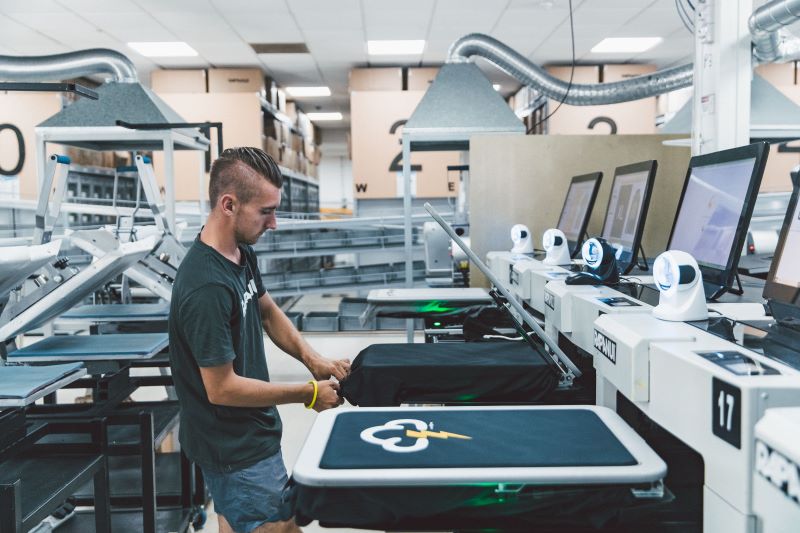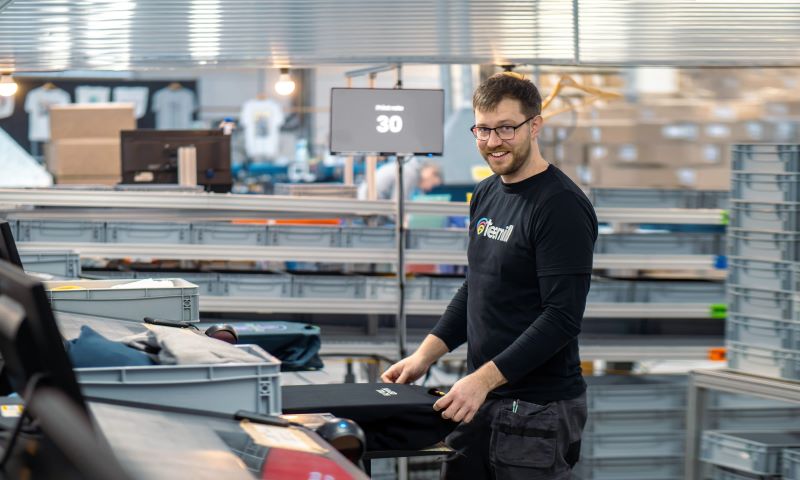Our website is reader supported. We sometimes earn a small affiliate commission for purchases made through links in our posts, at no extra cost to you. Read more about our policy.
Rapanui, in case you haven’t heard of them, are an award-winning circular fashion brand from the Isle of Wight, on a mission to make real change in the fashion industry.
And they really are showing the way for the future of fashion. So I was delighted to be able to interview co-founder Mart Darke-Knight, who set up the sustainable clothing brand with his brother Rob in 2008.

Brothers Mart and Rob are on a lifelong mission to reduce waste through circular design. At the end of its life, you can send your old Rapanui clothing back, as it’s designed from the start to be remade into new products when worn out. This gives good material a second life, and keeps it out of landfill. They’ll even pay your postage in the UK and give you a coupon off your next purchase.
They reduce their environmental impact further by using renewable energy sources for their factory.
The brothers found that they could make cost savings by manufacturing products in the moment after they are ordered rather than mass producing, hence reducing waste further. And as well as their own brand, they are now sharing their technology through their platform Teemill which allows anyone to set up their own sustainable brand using circular economy principles from the start, for free! Fashion industry take note.
The interview
Here’s what Mart had to say!
Tell us about Rapanui, what sets you apart?
A lorry full of textile waste is getting burned or buried per second, 60% of it plastic. So Rapanui was created to change business-as-usual to work towards a world without waste.
We do that by using natural materials, renewable energy, and all our products are designed from the start to be sent back and remade. That’s what a circular economy for clothing looks like to us. That’s how we’re eliminating waste, reducing carbon emissions and regenerating nature.

What is your background and what made you decide to start Rapanui?
When I was 5 my mum taught me about how bins work: we take all the stuff and the packaging that we buy, make, eat produce use and put it in a plastic bag and then a lorry comes round and each house throws their bag into the lorry, then it drives round and over the hill, and when nobody is looking they reverse and dump it into a field. And then we run away. So I started crying.
Later when I was a student I got to go and visit a landfill and as we came over the top of the hill, I saw the lorry – reversing into a field – dumping the bags of trash on the floor. I realised this was what business-as-usual looked like. Then I decided to do something about it.
Rob and I decided that if we couldn’t find the product we wanted to see in the world, products that wouldn’t end up in landfill, in the environment, the only choice was to create them ourselves.
how do you source your fabrics and base materials?
We use GOTs certified organic cotton grown naturally in India. The crops are fed by reservoirs that fill during the monsoon season. Using cotton grown organically leads to healthier outcomes for the environment and the people that work with it.
We visit our suppliers regularly. The factories are powered by renewable energy and have a closed-loop water system. It recycles water to minimise waste to an amazing level of efficiency. I even drank the water on a visit not long ago.

Do you take into account the recyclability of your products?
We’ve built a circular economy for clothing, which is a bit different to recycling.
Almost everything in the world is made in a linear model. You can think of it like a giant conveyor belt, where resources are taken from the environment to be made into products that are designed to be thrown away. If you take that line, and bend it into a circle, the material can flow back to the original manufacturer, and instead of creating waste, you create new products from the material you recover.
We do that with a QR code in all of our products. When the products are worn out, you scan the QR code and send it back to us so we can make new products with it. You’re rewarded with store credit when you do that.
Who makes your clothes?
Making clothes ethically means considering the impacts of our processes and materials on the whole supply chain, from the growers of organic cotton to where our clothes end up. Our clothes are made in a variety of locations in Europe and India and we visit our suppliers regularly to ensure good working conditions and fair wages.
To help create efficiencies in our factories, we’ve created technology that enables automation. Yet, technology does not mean removing people from employment. In our factories the robots and code are designed by the people who print, pick and pack orders giving the opportunity for skilled employment in technology and engineering.
Are any animals used in the production of your products and if so how do you make sure that they are treated ethically?
No animals are used in the production of our products, which makes our clothing vegan friendly, including our knitwear.
What else makes Rapanui sustainable?
We’ve created a new type of factory where printed products are made in the seconds after you order them. This eliminates the need to make products speculatively – a huge source of waste in the clothing industry. Instead we only make what people need, when they need it.
Our factories can all talk to each other, which means we can send orders across borders, saving on shipping, carbon and time. All these savings can then be re-invested into more sustainable materials, renewable energy, plastic-free packaging.
What are the biggest challenges in operating as an ethical and sustainable fashion brand?
When we started, we started with t-shirts. We were trying to do a really good thing here and if you’re good you get rewarded – that’s what they say. When we took our first positive steps in that direction, it felt like the system itself gave us a hard-core smackdown.
The more we tried to use clean materials, the more we tried to use renewable energy, the more expensive it got – we were punished with cost. But if we chose polluting materials and used fossil fuels, that was – and still is – rewarded with lower prices.
Sustainability isn’t easy. It requires changing the system and that’s what we’re trying to do.
“Sustainability is not about being perfect, but a journey”, how can you improve further and what plans do you have for the future?
We wanted to make our technology available for anyone to use, so that we could spread solutions for sustainability even further, faster. So we put it on the internet for anyone to use, to make clothing sustainably. It’s called Teemill. And after a few years something like 10,000 brands and businesses are now using Teemill and we’re helping brands and businesses reach their sustainability goals through Teemill.
Rapanui is continuing to design simple, functional, stylish clothing, inspired by coastal living, with exciting new products, like the new knitwear line this autumn. We’re particularly excited about a new product category next year for water lovers. Stay tuned for that.

What one thing could fast fashion brands do to improve?
I think we’re all guilty sometimes of thinking of The Economy as a rigid rule set that is imposed upon us. And we talk about the rules like we’re just players. But who makes these rules? I think it’s a bit like that realisation when we grow up and think that adults are in charge, then you become an adult… and realise no one person is in charge.
The Economy is not a thing that happens to us, it is us.
Why not reimagine not just new products but new business models – the place where products come from. Because if the economy is a big game made up by adults, and we’re the adults now, any of us can choose the rules, move pieces around, and change the game.
What are your favourite products in your range right now and why?
We’ve just released a new range of knitwear which is really exciting. Everyone at Rapanui HQ is particularly excited about the Offshore Striped Knitted Jumper, and the knitted cardigan. These have been designed inspired by our coastal heritage and island living.
Thanks so much to Mart for taking part in this interview and we wish the brand and the fledgling brands starting up with Teemill tonnes of success in the months and years to come!
To find out more about their new knitwear range and the rest of their circular wardrobe line up, check out the link below:
YOU MIGHT ALSO LIKE…





















